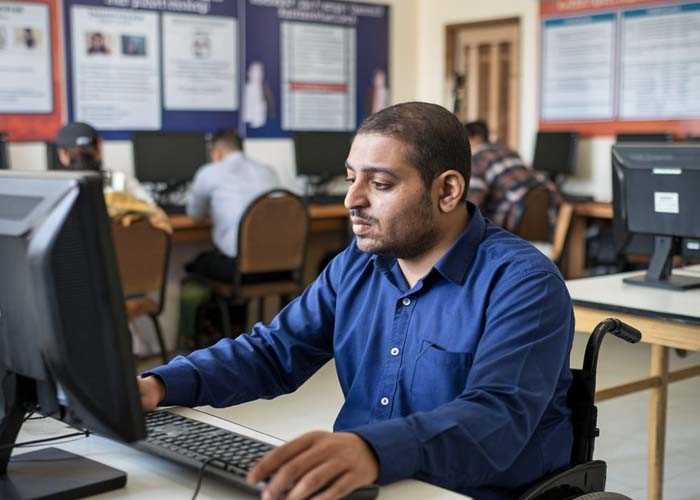

E-Learning Competence Center
Pillars : E- Learning & Digital Literacy
The E-Learning Competence Center (ELCC) was established in 2004 under a cooperation agreement between the Ministry of Communications and Information Technology and Cisco Systems International to be one of the leading Egyptian institutions in the field of e-learning industry, developing e-content and providing online training courses using the latest e-learning and blended learning technologies and methods.
The E-Learning Competence Center seeks to provide young people with the latest technical and technological skills they need to add effectiveness, productivity and competitiveness to their capabilities, by providing distinguished e-training content supported by case studies and best practices.
Vision:
Using and integrating the latest methods of communications and information technology to develop the educational process as it is the driving tool for the wheel of human, economic and social development in Egypt, by qualifying a generation capable of distinguished performance in light of global competitiveness and meeting the requirements of the labor market locally and internationally.
Strategic objectives:
• Promoting and developing the e-learning industry in Egypt and exploiting its resources.
• Developing a new e-learning system based on transferring leading global expertise and experiences in this field.
• Disseminating e-learning quality standards in Egypt.
• Promoting and encouraging the e-learning culture that achieves equality in access to learning opportunities
and the effective use of communications and information technology.
• Preparing qualified cadres of e-learning leaders by developing their skills in project management.
• Building human resources and helping to provide job opportunities.
The basic units of the e-learning competitive center:
The National Network of e-learning centers:
The Competitive Center established the National Network of e-learning centers (NDN) to be one of the main pillars used by the center to reach target groups throughout the republic and provide content publishing and e-training services. The center has accredited about 750 e-learning centers across the republic, which contribute to human and community development and the dissemination of entrepreneurship policy using e-learning technology, which led to the qualification of 70 thousand citizens in various training components within 5 years. This number of e-learning centers that have been established represents more than 20% of the number of Cisco academies around the world.
Lifelong Learning Unit:
The Lifelong Learning Unit is one of the main pillars of the E-Learning Competitive Center, which aims to spread the idea of lifelong learning and promote the culture of e-learning by preparing a generation capable of distinguished performance in light of international competitiveness and meeting the requirements of the labor market and providing equal opportunities for learning.
The Lifelong Learning Unit seeks to bridge the gap between needs and requirements of the labor market through an electronic portal for lifelong learning programs offered by the center that contains many specialized educational programs and tracks such as e-content development skills programs, life skills, entrepreneurship, information technology, and empowerment of people with special needs. This is done through an integrated e-learning environment starting from electronic registration and reviewing content to evaluation and issuing electronic certificates to achieve maximum benefit from the advantages of e-learning by saving time, effort and cost by using and applying e-learning tools.
The programs target all different segments of society from students at various educational levels and workers in the government and private sectors, youth, entrepreneurs, owners of small and medium enterprises and those interested in the e-learning industry.
Training and dissemination of the culture of e-learning:
Training is one of the main activities that the center is interested in, as it is the most important tool for raising and building capacities for all segments of Egyptian society, and it is also an effective means of spreading the culture of e-learning. The training department works side by side with the national network of e-learning centers that the center established during the previous years, which covers all governorates, and targets many governmental and non-governmental institutions from civil society organizations and non-profit organizations.
The center is keen to apply quality standards in all stages of training, starting from selecting and accrediting training centers, training trainers, following up on training and issuing reports. The center is building a training model that depends on preparing qualified cadres of TOT trainers so that they are able to provide high-quality training to the end beneficiaries in their locations. The training also includes raising the technical capabilities of these trainers so that they are able to create and manage electronic classes with all their elements (content, activities, and students).
In this regard, the Competitive Center for E-Learning uses both distance learning and blended learning systems according to the nature of each of the scientific material, the special circumstances of the beneficiaries, and the locations of workshops and training. The center also seeks to target marginalized groups and residents of deprived areas and achieve maximum benefit from the desired training outcomes at the lowest cost and highest quality.
On the other hand, the center adopts some global training programs that rely on the e-learning method as a method of training in order to raise the capabilities of young people according to the latest global training programs. The center also offers many educational tracks that target entrepreneurs, owners of small and medium enterprises, and teachers. The center also pays special attention to providing training programs to raise the skills of producing and developing electronic content, which helps create job opportunities in this field, which in turn will contribute to increasing the percentage of Arabic electronic content on the Internet.
Electronic Content Development Unit:
The Content Development Unit at the Competitive Center is concerned with producing the electronic content necessary for the training process using the latest technological means and tools. The center also has many distinguished experiences in the field of e-learning industry that were built through joint work and cooperation with many leading global institutions and entities in this field.
The Content Development Unit seeks to achieve a number of strategic objectives such as transferring expertise and best global practices to Egyptian companies working in the field of electronic content development, adopting and publishing standards for content production and development in light of international standards, cooperating with Egyptian academic institutions to help them move towards providing effective e-learning services, and working within international projects with the aim of transferring expertise to the center's work teams to keep pace with the wheel of development and modern global trends in the field of e-learning industry. The center also relies on modern and scientific methods in the process of developing electronic courses according to precise steps that begin with analyzing needs and analyzing the target group, analyzing and studying the content, then determining the optimal goals and strategies for presenting it electronically, the process of technical development and integrating interactive elements and multimedia, and finally designing various evaluation tools to measure the effectiveness of the content in achieving the desired goals and making the necessary adjustments. The unit also has experience in the field of Arabizing electronic courses presented in languages other than Arabic according to the latest international Arabization methods while preserving the Egyptian identity in those courses, taking into account all the technical dimensions of this process. To increase competitiveness in the field of content development, the center has paid special attention to the issue of “research and development,” which aims to test and study all alternatives and technical solutions available in the global market and submit periodic reports to evaluate these solutions in light of local needs. It also provides a number of periodic workshops to train young people on the latest technologies in light of the results of the research.

 العربية
العربية